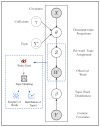Exploring the Factors Associated with Mental Health Attitude in China: A Structural Topic Modeling Approach
- PMID: 36231878
- PMCID: PMC9566640
- DOI: 10.3390/ijerph191912579
Exploring the Factors Associated with Mental Health Attitude in China: A Structural Topic Modeling Approach
Abstract
Mental health attitude has huge impacts on the improvement of mental health. In response to the ongoing damage the COVID-19 pandemic caused to the mental health of the Chinese people, this study aims to explore the factors associated with mental health attitude in China. To this end, we extract the key topics in mental health-related microblogs on Weibo, the Chinese equivalent of Twitter, using the structural topic modeling (STM) approach. An interaction term of sentiment polarity and time is put into the STM model to track the evolution of public sentiment towards the key topics over time. Through an in-depth analysis of 146,625 Weibo posts, this study captures 12 topics that are, in turn, classified into four factors as stigma (n = 54,559, 37.21%), mental health literacy (n = 32,199, 21.96%), public promotion (n = 30,747, 20.97%), and social support (n = 29,120, 19.86%). The results show that stigma is the primary factor inducing negative mental health attitudes in China as none of the topics related to this factor are considered positive. Mental health literacy, public promotion, and social support are the factors that could enhance positive attitudes towards mental health, since most of the topics related to these factors are identified as positive ones. The provision of tailored strategies for each of these factors could potentially improve the mental health attitudes of the Chinese people.
Keywords: COVID-19; China; Weibo; mental health attitude; social media; structural topic modeling; text analysis.
Conflict of interest statement
The authors declare no conflict of interest.
Figures






Similar articles
-
Topic modeling and sentiment analysis of Chinese people's attitudes toward volunteerism amid the COVID-19 pandemic.Front Psychol. 2022 Nov 4;13:1064372. doi: 10.3389/fpsyg.2022.1064372. eCollection 2022. Front Psychol. 2022. PMID: 36405177 Free PMC article.
-
Exploring public attitudes toward live-streaming fitness in China: A sentiment and content analysis of China's social media Weibo.Front Public Health. 2022 Nov 3;10:1027694. doi: 10.3389/fpubh.2022.1027694. eCollection 2022. Front Public Health. 2022. PMID: 36408048 Free PMC article.
-
Concerns Expressed by Chinese Social Media Users During the COVID-19 Pandemic: Content Analysis of Sina Weibo Microblogging Data.J Med Internet Res. 2020 Nov 26;22(11):e22152. doi: 10.2196/22152. J Med Internet Res. 2020. PMID: 33151894 Free PMC article.
-
Public Discourse and Sentiment Toward Dementia on Chinese Social Media: Machine Learning Analysis of Weibo Posts.J Med Internet Res. 2022 Sep 2;24(9):e39805. doi: 10.2196/39805. J Med Internet Res. 2022. PMID: 36053565 Free PMC article.
-
Exploring the Chinese Public's Perception of Omicron Variants on Social Media: LDA-Based Topic Modeling and Sentiment Analysis.Int J Environ Res Public Health. 2022 Jul 8;19(14):8377. doi: 10.3390/ijerph19148377. Int J Environ Res Public Health. 2022. PMID: 35886225 Free PMC article.
Cited by
-
Topic modeling and sentiment analysis of Chinese people's attitudes toward volunteerism amid the COVID-19 pandemic.Front Psychol. 2022 Nov 4;13:1064372. doi: 10.3389/fpsyg.2022.1064372. eCollection 2022. Front Psychol. 2022. PMID: 36405177 Free PMC article.
-
Mental health status among non-medical college students returning to school during the COVID-19 pandemic in Zhanjiang city: A cross-sectional study.Front Psychol. 2023 Jan 11;13:1035458. doi: 10.3389/fpsyg.2022.1035458. eCollection 2022. Front Psychol. 2023. PMID: 36710795 Free PMC article.
-
Knowledge, attitudes, and practices regarding whole-course management among patients with gastrointestinal cancers: a cross-sectional study.World J Surg Oncol. 2025 Feb 10;23(1):45. doi: 10.1186/s12957-025-03668-7. World J Surg Oncol. 2025. PMID: 39924482 Free PMC article.
-
Exploring sources of patient dissatisfaction in mobile health communication: A text analysis based on structural topic model.Digit Health. 2024 Oct 1;10:20552076241287890. doi: 10.1177/20552076241287890. eCollection 2024 Jan-Dec. Digit Health. 2024. PMID: 39381814 Free PMC article.
References
-
- Zhao N., Wang Y., Li S., Liu X., Wu P., Zhu T. Impact of Wuhan city lockdowns on psychology and behavior among general population. Bull. Chin. Acad. Sci. 2020;035:264–272.
Publication types
MeSH terms
LinkOut - more resources
Full Text Sources
Medical

